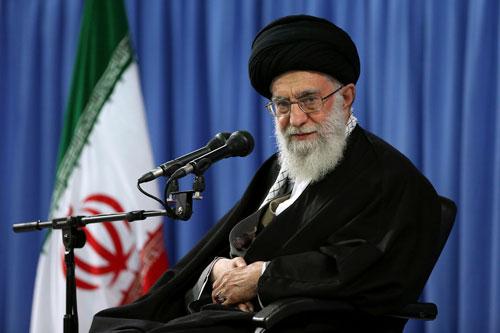You are here
Iran’s supreme leader says interaction with US limited to nuclear talks
By Reuters - Aug 13,2014 - Last updated at Aug 13,2014
DUBAI — Iran’s supreme leader Ayatollah Ali Khamenei said on Wednesday nuclear talks with world powers would continue, but added there was no point in holding negotiations with the United States on other issues.
Khamenei, who has the last word on all matters in Shiite Muslim Iran, appeared to give a nuanced message on the country’s often fraught relationship with Washington.
The nuclear talks, which involve the United States, have resulted in an interim deal under which Tehran has curbed some atomic activity in exchange for limited sanctions relief.
“There are no benefits in having relations or negotiations with the United States, except in certain specific cases,” Khamenei told a gathering of Iranian diplomats, according to a statement on his website.
“Of course, on the nuclear front, talks will continue. What [Foreign Minister Javad] Dr Zarif and his team started and has been going well until now, will continue,” he said.
Six major powers and Iran failed to meet a July 20 deadline to negotiate a comprehensive nuclear agreement. The six — Britain, China, France, Germany, Russia and the United States — agreed to extend the deadline until November 24.
“We will not ban them [the negotiations]. But this has become yet another invaluable experience that interaction and talks with Americans have absolutely no effect in easing their animosity [towards Iran],” Khamenei said.
“Some people were under the impression that sitting down to talk with America would solve all our problems. I knew that wouldn’t be the case, but gave it a try due to the sensitive nature of the nuclear issue,” he said.
“Now the events of the past year have proved this hunch to be true. Not only did we gain nothing out of these interactions, but the tone of American officials have become harsher and more insulting,” he said.
Last year, Khamenei had called for “heroic flexibility”, giving cautious support to the talks after many years of Iranian refusal to discuss any curbs on the nuclear work it says is for peaceful purposes, but which Tehran’s critics believe is aimed at developing weapons capability.
The interim nuclear deal has also come under attack by some Iranian hardliners who are unsettled by the shift to a more a moderate foreign policy since Iranian President Hassan Rouhani took office a year ago.
Earlier this week, Rouhani called critics of his nuclear policy “cowards”.
Related Articles
Iranian Supreme Leader Ayatollah Ali Khamenei on Thursday demanded that all sanctions on Iran be lifted at the same time as any final agreement with world powers on curbing Tehran's nuclear programme is concluded.
Iran’s supreme leader vowed to continue nuclear talks resuming with world powers on Tuesday despite some reservations, in his strongest sign of support for moderate President Hassan Rouhani’s push to resolve the conflict peacefully.
The UN nuclear agency and Tehran met Saturday for talks on allegations of past Iranian weapons work and to seek additional safeguards to allay international concerns over its nuclear ambitions.

















